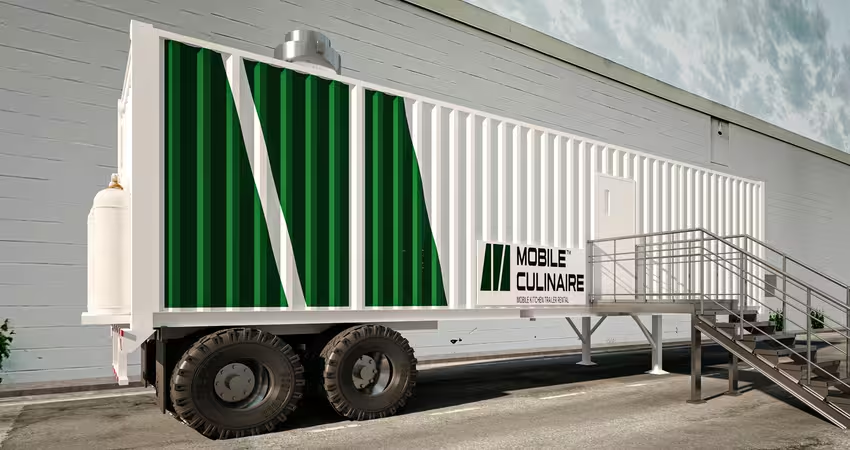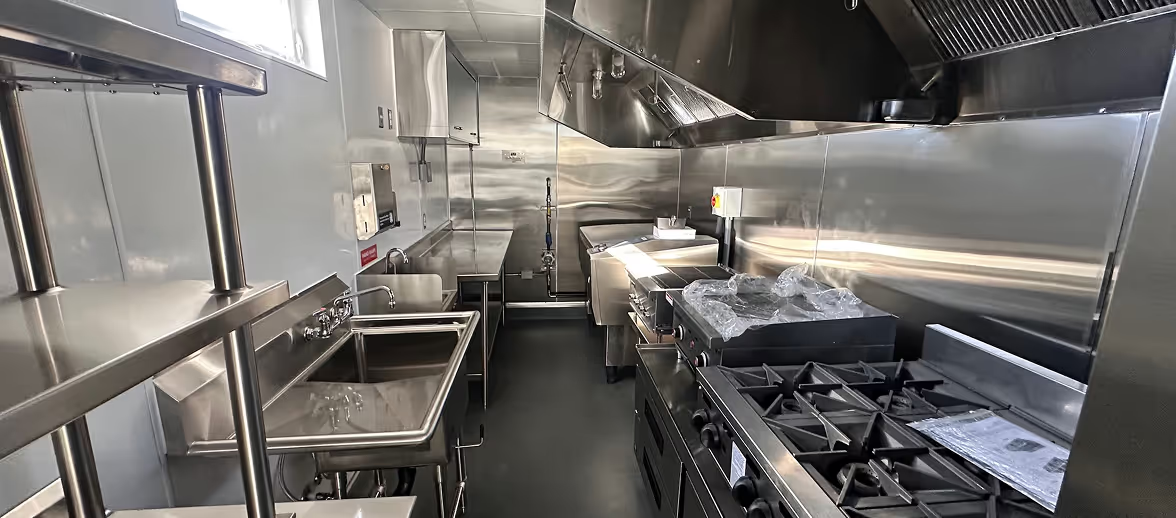
Introduction
Renovating a commercial kitchen is a major investment but when done right, it can improve workflow, boost safety, increase capacity, and create a better experience for both your staff and your customers. Whether you're upgrading outdated appliances or doing a full redesign, a commercial kitchen renovation requires serious planning and coordination to avoid costly delays and disruptions.
According to the National Restaurant Association, renovations can cost $250,000 to over $1 million, making smart preparation essential. Mistakes can lead to delays, health code issues, and lost revenue.
This guide will walk you through everything you need to know before starting your renovation project: from timing and permitting to maintaining operations with mobile kitchens. Whether you're a restaurant owner, school administrator, hospital facility manager, or hotel executive, these tips will help you stay compliant, on budget, and fully operational throughout your renovation.
Why Planning Matters in Commercial Kitchen Renovation
Unlike residential remodels, commercial kitchen renovations come with strict regulatory oversight and complex operational logistics. The stakes are high: closing down for too long can hurt revenue, while rushing into construction without proper permitting or inspection prep can delay reopening. According to the FDA Food Code, commercial kitchens must meet strict requirements for ventilation, food safety, and sanitation before resuming operations.
Meticulous preparation is the key to success. A well-planned renovation:
- Ensures compliance with health and building codes
- Minimizes downtime and service disruption
- Prevents budget overruns
- Keeps your staff and customers safe
- Protects your business continuity
The earlier you start planning, the smoother your renovation will go. Let’s dive into the essential steps!
.avif)
Steps to Prepare for a Commercial Kitchen Renovation
Pick the Right Time to Close Your Kitchen
Timing is critical during a commercial kitchen renovation. A poorly planned closure can lead to major revenue loss and long-term operational disruption.
- Review your business trends and select an off-peak season, scheduled holiday break, or slower service period to minimize the impact.
- Inform staff and customers early to manage expectations and maintain goodwill.
Note: Restaurants can lose up to 30% of annual revenue during renovations if timing isn’t optimized.
Check Health & Safety Code Requirements
Every renovation must comply with current local and federal food safety and building codes. Failing to do so can result in costly delays and fines.
- Research relevant regulations around fire safety, ventilation, food storage, sanitation, accessibility, and grease management.
- Work with experienced contractors or consultants who specialize in commercial kitchens to avoid compliance issues.
Note: Non-compliance penalties can range from $500 to $5,000 per violation.
Secure All Necessary Permits
Permitting delays are a leading cause of renovation setbacks. It’s essential to understand the approval process well in advance.
- Identify all required permits, including building, electrical, plumbing, fire safety, and temporary food service (if staying open).
- Submit applications early as approval may take four to eight weeks or longer.
- Keep printed and digital copies of all permits on-site for inspections.
Rent a Mobile Kitchen to Keep Serving Customers
Staying operational during a renovation is possible with a temporary mobile kitchen solution.
- Choose a fully equipped mobile unit that supports your current workflow and menu.
- Partner with an experienced provider like Mobile Culinaire to ensure code compliance, proper setup, and a smooth transition.
Note: A country club in California undergoing a five-month renovation used a Mobile Culinaire 2x53' mobile kitchen to maintain uninterrupted and high-end foodservice, retaining staff and preserving revenue throughout construction.
Want to learn more about mobile kitchen rentals? Read our article on why mobile kitchen trailers are the perfect temporary kitchen solution.
%2520(1).avif)
Plan Every Detail of Your Renovation
A successful renovation hinges on thorough planning. Without it, costs rise and timelines slip.
- Collaborate closely with architects, designers, and contractors to finalize layout, materials, utility needs, and schedules.
- Include contingency plans for material delays, permitting issues, or construction complications.
Note: An estimated 35% of construction projects experience delays due to poor or incomplete planning.
Set a Realistic Budget
Renovations often run over budget. Building in financial flexibility reduces stress and prevents operational interruptions.
- Account for demolition, construction, permitting, equipment, mobile kitchen rentals, and staff training.
- Set aside 10-20% of the total budget for unforeseen expenses.
- Track costs closely throughout the project.
Keep Your Staff Informed
A well-informed team can adapt more easily to changes during the renovation process.
- Provide clear communication on renovation timelines, temporary work environments, safety procedures, and reopening plans.
- Offer training for any new equipment or kitchen layout to avoid disruptions post-renovation.
Note: Companies that actively involve employees in business changes see a 74% increase in overall job satisfaction.
Schedule and Pass Inspections
Inspections are essential for reopening. Failure to plan for them can push your timeline back by weeks.
- Build inspections into your project calendar: this includes plumbing, electrical, fire suppression, ADA compliance, and final health department approvals.
- Stay ready to respond quickly to any inspector feedback to avoid delays.
Note: Most commercial kitchen inspections take between two and four hours but may require follow-up if issues are found.
.avif)
How Mobile Culinaire Helps Reduce Renovation Downtime
During a commercial kitchen renovation, maintaining operations is critical. Mobile Culinaire provides fully equipped, code-compliant mobile kitchens that help foodservice teams continue working while the main kitchen is offline. These aren't food trucks, they’re full-scale commercial kitchens designed for high-volume output, code compliance, and efficient deployment.
Fast & Turnkey Deployment
Mobile kitchens can be operational in 24 to 72 hours, depending on the setup. Compared to building a temporary facility, they deploy up to 50% faster, a major advantage as 70% of contractors report delays due to labor shortages.
Maintain Business Continuity
From hotel kitchens to school cafeterias and hospital foodservice lines, Mobile Culinaire units allow you to continue serving without interruption. Guests and customers receive the same quality of service while your renovation moves forward behind the scenes.
Budget-Friendly Solution
Mobile kitchen rentals eliminate the need for costly structural build-outs or retrofits. Their plug-and-play setup reduces labor, utility installation, and teardown expenses, making them a cost-effective alternative to construction.
Built for Code Compliance
Every unit is designed to meet or exceed local health and safety regulations. Features include:
- NSF-rated prep surfaces
- Commercial-grade ventilation
- Integrated sanitation stations
- ADA-compliant access
This ensures smoother inspections and fewer risks of violations during the renovation period.
Scalable and Adaptable
Mobile kitchens can be relocated, reconfigured, or expanded with add-on units like dishwashers or cold storage. Whether you need a short-term solution or longer-term flexibility, Mobile Culinaire adapts to your timeline and workflow.
%2520(1).avif)
Conclusion
A successful commercial kitchen renovation starts long before demolition begins. From choosing the right time to securing permits and planning for inspections, every detail matters. Without proper preparation, you risk delays, revenue loss, and compliance issues that can derail your operation.
The good news? With early planning and smart solutions like renting a mobile kitchen, you can minimize downtime, stay compliant, and keep serving customers throughout the renovation.
Whether you're managing a hotel kitchen upgrade, a healthcare facility expansion, or a restaurant overhaul, having a clear renovation strategy and the right partners makes all the difference.
Planning a renovation? Explore Mobile Culinaire’s compliant, fully equipped mobile kitchen rentals or contact us today to keep your kitchen running smoothly.
People Also Ask (FAQ)
How much does a commercial kitchen renovation cost?
The cost of a commercial kitchen renovation typically ranges from $50,000 to $250,000, depending on factors like kitchen size, facility type, scope of structural work, and equipment upgrades. Full redesigns with utility upgrades and new layouts fall at the higher end. Make sure to always include contingency funds for permitting delays or material cost changes.
How long does it take to renovate a commercial kitchen?
Timelines vary, but most renovations take between 6 to 24 weeks. Minor upgrades might be completed in under a month, while full overhauls can take several months, especially if permits or inspections are delayed. Using a mobile kitchen during construction allows operations to continue while work is completed in phases.
Can I continue operations during a commercial kitchen renovation?
Yes. Many businesses stay operational by renting a mobile kitchen. These fully equipped units can be set up on-site to match your workflow, allowing you to continue serving guests or customers without interruption. It’s a reliable solution for hotels, schools, healthcare facilities, and restaurants.
Testimonial

"What is standing out when you look at the mobile kitchen operation is the efficiency that we can really achieve because it's built for that."
Tell us about your kitchen needs and request a quote.
.png)
Turnkey mobile kitchen
.png)
Proudly made in-house in the USA
.png)
Commercial grade kitchen equipment
.png)
Code-compliant
Trusted by Industry Leaders




.gif)

%20(1).avif)
%20(1).avif)
%20(1).avif)